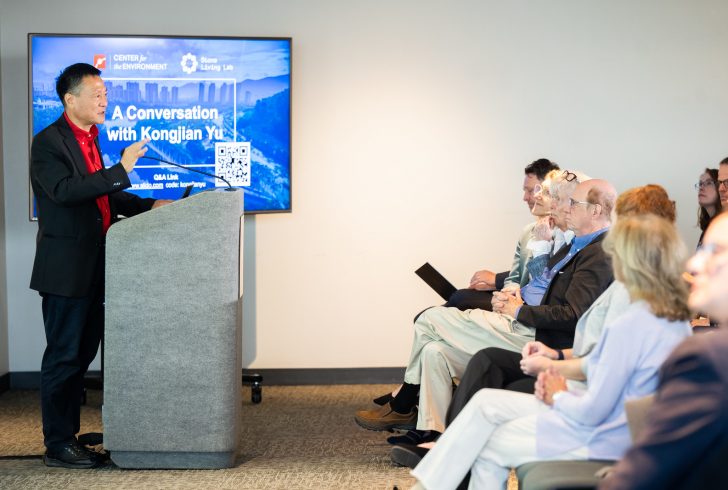Boston institutions, Stone Living Lab welcome “sponge city” global climate leader Kongjian Yu for inspiring two-day visit


BOSTON, October 24, 2024 – Professor Kongjian Yu, widely considered the world’s most influential expert in nature-based redesigns of cities to accommodate severe storms, rising sea levels and other impacts of climate change, enjoyed a warm welcome on a two-day visit to Boston to share his “sponge city” vision for climate resiliency.
Organized by the Stone Living Lab in partnership with the City of Boston, Museum of Science, and the University of Massachusetts Boston, Professor Yu’s Oct. 22-23 visit included a tour of 12 “green infrastructure” sites in Boston built to mitigate flooding and climate change impacts and the Outward Bound environmental education program on Cathleen Stone Island in Boston Harbor. Professor Yu also spoke and joined panel discussions at the Museum of Science and UMass Boston.
A landscape architect who serves on the faculty of Peking University, Professor Yu is also founder and principal designer of the Turenscape firm. During his visit he provided an in-depth look at several of the more than 600 “sponge city” urban water parks and riverfront and harbor redesigns he has overseen in over 250 cities throughout China as well as in Bangkok, Copenhagen, Malmo (Sweden), and other cities throughout the world.
The ”sponge city” vision involves replacing hard “gray infrastructure” storm and flood protection systems like seawalls, channelized rivers, and storm gutters with nature-based designs that retain water at its source as much as possible, slow down its flow as it moves downstream, and “give water more space” when it reaches the ocean.
“We need to think not just about building ‘sponge cities,’ but a ‘sponge planet’ as well,’’ Professor Yu said in his Museum of Science remarks. “If you want to solve the problem of Boston Harbor’s sea level rising, you really have to think about Boston as part of the globe. You cannot solve just one problem, you have to see the globe as a whole.’’
The Stone Living Lab is an innovative and collaborative initiative for testing and scaling up nature-based approaches to climate adaptation, coastal resilience and ecological restoration across the Greater Boston region and in the high-energy environment of the Boston Harbor Islands National and State Park. The Lab is a partnership among Boston Harbor Now, UMass Boston’s School for the Environment, the City of Boston, the Massachusetts Department of Conservation and Recreation, the Massachusetts Executive Office of Energy and Environmental Affairs, the National Park Service, and the James M. and Cathleen D. Stone Foundation.
Cathy Stone, president of the foundation, said: “I couldn’t be more pleased with Professor Kongjian Yu’s visit with us in Boston. The way we will mitigate and solve the problems caused by our impact on the environment, and improve everyone’s quality of life, is by bringing together and interacting with people from every part of our world to learn what’s working and why. I’m thrilled by how much we’ve learned from Professor Yu and have been inspired by him.”
UMass Boston Chancellor Marcelo Suárez-Orozco, who hosted Professor Yu for UMass Boston’s Chancellor’s Lecture Series “From Climate Crisis to Climate Resilience” on the afternoon of October 23, said: “The most important word in the English language when it comes to education is ‘possibility,’ and there is so much in what Kongjian Yu is teaching us about what is true, just, beautiful – and possible.”
Tim Ritchie, President of the Museum of Science Boston, said: “Professor Yu has something unique to bring to Boston and really every urban area in the world: This vision of the ‘sponge city’ and the idea that instead of fighting against nature, we can learn to work with it. We were delighted to have Professor Yu at the Museum of Science and look forward to helping take his research to millions of people and influencers around the world.”
Before speaking at the museum and UMass Boston, Professor Yu spent most of Tuesday, October 23, on a boat and bus tour of Cathleen Stone Island and 12 locations in Dorchester, Mattapan, Roxbury, the Fenway, and Allston that included Massachusetts’ first-ever Climate Chief, Melissa Hoffer, who leads the Office of Climate Innovation and Resilience within the Governor’s Office.
Led by Chris Osgood, director of Boston’s Office of Climate Resilience, and Kate England, director of Boston’s Office of Green Infrastructure, the tour included visits to multiple urban rain gardens, “bioswales,” and porous-pavement bike lanes and sidewalks designed to return stormwater to the ground and the constructed wetland at Harambee Park. Tour participants marveled at 12 rapidly-growing elm trees along Washington Street in front of the Nubian Square branch of the Boston Public Library nourished by rainwater. The tour also visited Harvard University’s new John A. Paulson School of Engineering and Applied Science campus in Allston that has been designed to handle, on site, up to “100-year storm” events and treat and reuse rainwater in labs and offices.
“I think Boston has great potential to become a ‘sponge city,’“ Professor Yu said in his remarks at UMass Boston. “Boston is exceptional. Boston has the best-educated public. You have Boston green infrastructure in place that is demonstrating that it works.” Moving from hard-surfaced, engineered solutions to stormwater and flooding to nature-based approaches, Professor Yu added, “is not expensive – it’s an investment.”
“We started the Stone Living Lab in 2020 because we wanted to learn which kinds of nature-based approaches can best be used to protect our city and region from climate change,’’ said Cathy Stone. “We’re a city that’s open to experimenting and to learning from people like Professor Yu. His visit has given us so much to consider and think about as we work to make Boston a healthier, happier, and better place to live for everyone.’’
A video that features some highlights from Kongjian Yu’s visit can be found here.